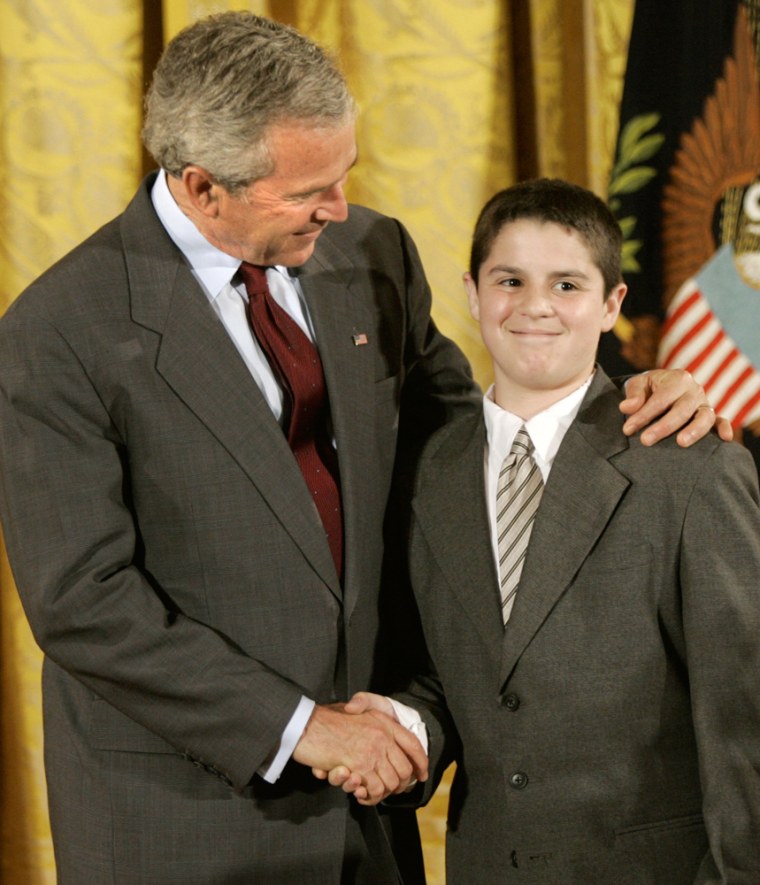Bad weather forced President Bush to cancel his Earth Day trip to the Great Smoky Mountains National Park, but he still managed to make a speech during a quick stop at a Tennessee airport, saying “it would sure be helpful” if Congress would pass an air pollution proposal he calls “clear skies legislation.”
The legislation is Bush’s top environmental priority, and would give power plants, factories and refineries more time to reduce their air pollution.
Last month, a Senate committee rejected the bill. Opponents want a plan that also puts limits on carbon dioxide, the “greenhouse” gas scientists blame for global warming, which Bush opposes regulating.
Bush’s proposal would reduce nitrogen oxides, sulfur dioxide and mercury in the air by letting smokestack industries trade pollution rights among themselves, within overall caps set by the government. The plan sets a 2018 deadline for reducing the three pollutants by 70 percent.
Defends policies
Often at odds with environmentalists, Bush celebrated their holiday by claiming a solid environmental record by his administration.
“We didn’t create the Earth but we have an obligation to protect it,” he said from an airport hangar, with a steady electrical hum and a view of the airfield providing quite a different backdrop than the White House planned. “We are meeting that obligation.”
Bush would have been the first sitting president to visit the park since Franklin Roosevelt dedicated it in 1940, McClellan said. Great Smoky gets more than 9 million visits a year, and is the most visited and most polluted national park.
The Smokies’ pollution problem is due mainly to industrial soot and smog from near and far away that collects in the mountains, creating vista-reducing haze, stunting plants with acid rain and threatening the health of asthmatic visitors with ozone.
“One of the greatest responsibilities in a free society is responsible stewardship of our natural environment,” Bush said Thursday at a White House ceremony to give environmental awards to youngsters. “All of you have taken that duty seriously. You have set a clear and strong example, and you’re inspiring others to do their part.”
Drilling, logging controversies
Environmentalists say Bush is not being a responsible steward by pushing for more timber, oil and gas from public lands and relying on the market rather than regulation to curb pollution.
Bush’s “healthy forests” law lets companies log large, commercially valuable trees in national forests in exchange for clearing smaller, more fire-prone trees and brush. His “clear skies” proposal would give power plants, factories and refineries more time to reduce air pollution. Environmentalists call those labels deliberate misnomers.
Bush’s was to have visited the Smokies to commemorate Earth Day, National Park Week and National Volunteer Week. More than 2,100 volunteers donated about 111,000 hours of service last year to assist visitors, rebuild trails and repair buildings in the park, which sprawls over more than 500,000 acres in Tennessee and North Carolina.
Youth awards
The 30 youngsters at the White House Thursday were honored for conservation projects that Bush said set a great example for others. Recipients set up recycling systems, built nesting boxes for birds and cleaned up local creeks, among other projects.
The Environmental Youth Award winners were from Middletown, R.I.; Staten Island, N.Y.; Saint Paul, Va.; Cairo, Ga.; Chesterland, Ohio; Del City, Okla.; Lincoln, Neb.; Hyrum, Utah; Chino Hills, Calif.; and Salem, Ore.
The annual awards were first started in 1971, a year after the first Earth Day. Background on this year's recipients and their projects is online at www.epa.gov/enviroed/peya2004.html.
